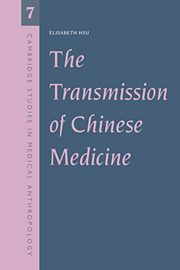Book contents
- Frontmatter
- Contents
- Acknowledgements
- Note on Chinese terms
- Introduction: ways of learning
- 1 The secret transmission of knowledge and practice
- 2 Qigong and the concept of qi
- 3 The personal transmission of knowledge
- 4 Interpreting a classical Chinese medical text
- 5 The standardised transmission of knowledge
- 6 Teaching from TCM texts
- Discussion: styles of knowing
- Appendix: Curriculum for TCM regular students and acumoxa and massage specialists
- Glossary of medical and philosophical terms
- References
- Indexes
3 - The personal transmission of knowledge
Published online by Cambridge University Press: 04 December 2009
- Frontmatter
- Contents
- Acknowledgements
- Note on Chinese terms
- Introduction: ways of learning
- 1 The secret transmission of knowledge and practice
- 2 Qigong and the concept of qi
- 3 The personal transmission of knowledge
- 4 Interpreting a classical Chinese medical text
- 5 The standardised transmission of knowledge
- 6 Teaching from TCM texts
- Discussion: styles of knowing
- Appendix: Curriculum for TCM regular students and acumoxa and massage specialists
- Glossary of medical and philosophical terms
- References
- Indexes
Summary
Zhang was a learned doctor who had scarcely participated in the reforging of Chinese medicine at government institutions. In the beginning of the 1980s, he founded a collective enterprise for health care and had, by the end of the decade, gathered a group of unemployed youth around him whom he trained in ‘acumoxa’ (zhenjiu) and ‘massage’ (tuina). He was an outsider of the Traditional Chinese Medical profession in the Socialist state, and precisely for this reason he appeared to me worth investigation. He seemed to have retained values and habits of Chinese medical learning that elsewhere had been abolished.
Zhang's biography was most unusual, his medical practice idiosyncratic, and the forum of our encounters, seminars on classical Chinese texts, had been instigated on my initiative. Nevertheless, his teaching and, especially, his mode of interpreting classical texts had certain features in common with others who called themselves ‘senior Chinese doctors’ (laozhongyi). Since he emphasised, like other senior doctors, the personal component in the relationship between the mentor and his followers, I propose to speak of the ‘personal transmission of knowledge’.
The setting and reminders of French colonialism
Zhang's practice was situated on the borders of Green Lake which surrounded a park of sweeping bridges and dainty pavilions, rowing boats and weeping willows, mirrored in still water. Old men with waterpipes and birdcages, sipping tea over a game of majiang, and the local singers who joined them in the late afternoon, made for an idyllic scene, but the water was smelly, the boats out of order, and the ground spotted with spittle. Nevertheless, the space and silence in and around the park conveyed something of forgotten nobility.
- Type
- Chapter
- Information
- The Transmission of Chinese Medicine , pp. 88 - 104Publisher: Cambridge University PressPrint publication year: 1999



